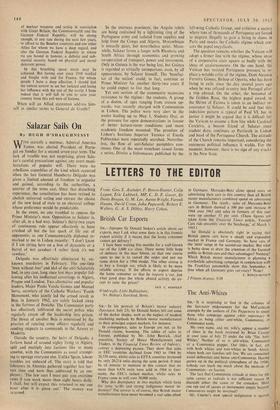Salazar Sails On
By HUGH O'SHAUGHNESSY
WITH scarcely a murmur, Admiral Americo Tomas was elected President of Portu- gal on Sunday for a second seven-year term. The lack of trouble was not surprising, given Sala- zar's careful precautions against any overt mani- festations of popular will. There were • no rebellious assemblies of the kind which occurred When the late General Humberto Delgado was given a limited amount of freedom to organise and gained, according to the authorities, a quarter of the votes cast.. Since that disturbing experience, the constitution has been revised to abolish universal voting. and entrust the choice of the new head of state to an electoral college whose preference would be predictable.
In the event, no one troubled to oppose the Prime Minister's man. Opposition to Salazar is, after all, in a bad way. Salazar's thirty-two years of continuous rule appear effectively to have crushed all but the last spark of life out of opponents; as one Commonwealth diplomat re- marked to me in Lisbon recently: 'I don't know if I am sitting here on a. box of dynamite or a barrel of wet sawdust—I rather think it's wet sawdust.'
Delgado was effectively eliminated by un- known, murderers in February. The one-time 'man without fear' and idol.of the anti-Salazarists had, in any case, long since lost mass popular fol- lowing after his ineffectual cavortings in Algiers, Prague and London. Two alternative and popular leaders, Major Paulo Varela Gomes and Manuel Serra, secretary of the Catholic Workers' Youth Movement, who jointly led the armed revolt in Beja in January 1962, are safely locked away in the fortress of Peniche. The Communist party has effectively infiltrated the secret police who
' regularly cream off the leadership into prison. The threat of another Beja is minimised by the practice of rotating army officers regularly and sending suspects to commands in the Azores or Madeira.
Outside the country, the heirs of Delgado, a forlorn band of around eighty living in Algiers, split and multiply into faotions like so many amoebae, with the Communists as usual attempt- ing to upstage everyone else. Unlike'Spain, labour troubles are unheard of. The story is told that labourers in Alentejo gathered together last har- vest time and were thus addressed by an em-
ployer: 'The law says I must pay you overtime rates if you work more than eight hours daily. I shall, but will expect this returned to me one hour after it is given out.' The money was returned. In the overseas provinces, the Angola rebels are being contained by a tightening ring of the Portuguese army and isolated from supplies and help from the Congo and Algeria. Mozambique is uneasily quiet, but nevertheless quiet. Mean- while, Salazar forms a laager with Rhodesia and South Africa through economics and growing co-operation of transport, power and investment. Only in Guinea is the war being lost, but Guinea is regarded as virtually unimportant, even, by all appearances, by Salazar himself. The 'benefac- tor of the nation' could, in fact, continue as' Prime Minister for another thirty-two years if he could expect to live that long.
Yet one section of the community maintains resistance to the regime: the students. A group of a dozen, of ages ranging from sixteen up- wards, was recently charged with Communism in Lisbon. The police were very alert in the weeks leading 'up. to May 1, Students Day, as the pressure for open demonstrations in favour of better lecture-room conditions and more academic freedom mounted. The premises of Lisbon's Instituto Superior Tecnico et Bscola Politecnico were repeatedly searched. Neverthe- less, the flow of anti-Salazar pamphlets con- tinues. One of the most trenchant issued forms a series, Direito a Informacao, published by the
left-wing Catholic Group, and criticises a society where tens of thousands of Portuguese are forced to migrate illegally to gain a living in slums in Paris and mocks the Catholic regime, which cen- sors the papal encyclicals.
The question remains whether the Vatican will adopt a firmer line with the regime, whose ideas of a corporative state square so badly with the ideas of aggiornamento. On the one hand, the Vatican has resisted Portuguese pressure to re- place a notable critic of the regime, Dom Antonio Ferreira Gomes, Bishop of Oporto, who has been living in exile since the ,day several years ago when he was refused re-entry into Portugal after a trip abroad. On the other, the bestowal of the Golden •Rose, the highest papal award, to the Shrine of Fatima is taken as an indirect re- assurance to Salazar. It could be said that this indecisive pattern is typical of Paul VI, but in justice it might be argued that it is difficult for the Vatican to assume a firm line while Cardinal Cerejeira, a. bosom friend of Salazar since student days, continues as Patriarch in Lisbon 'and head of the Portuguese Church. The attitude of the Church remains important, considering the enormous , political influence it wields. For the moment, however, there is no sign of any cracks in the New State.




























 Previous page
Previous page